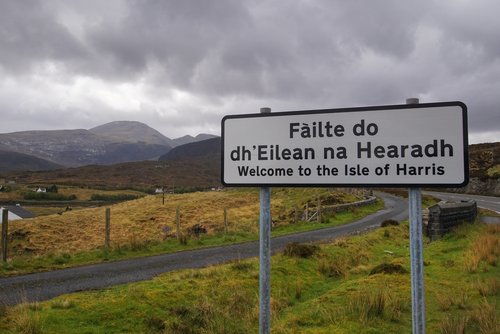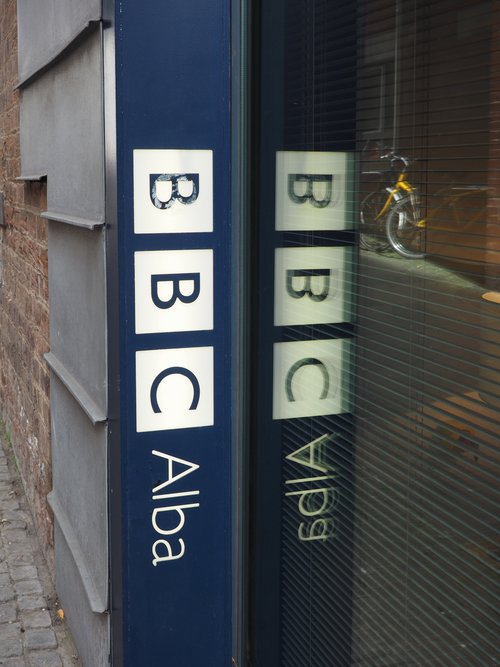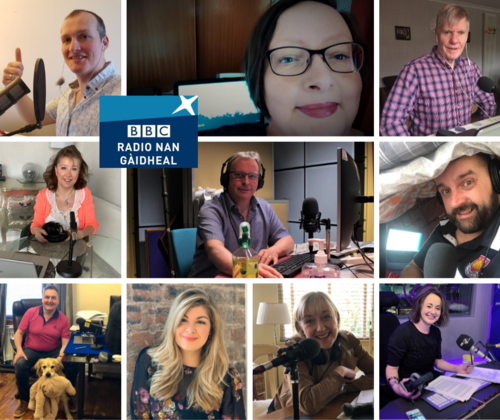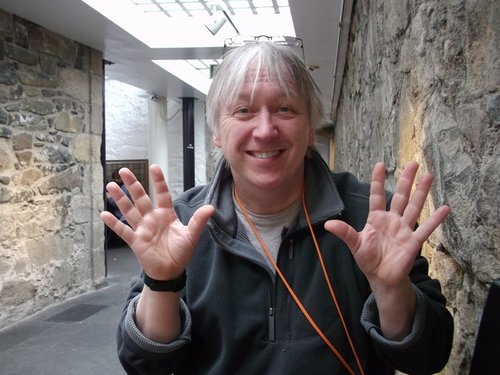Minority language media and the COVID-19 pandemic – the case of Scottish Gaelic. An interview with Dr. Douglas Chalmers.




A series edited and conceptualised by Dr. Sergiusz Bober and Craig Willis.
In our tenth and final expert interview in the series on minority language media and the effects of COVID-19 pandemic, we return to the British Isles for an in-depth analysis of Scottish Gaelic. Dr. Douglas Chalmers, Senior Lecturer in Media and Journalism at Glasgow Caledonian University, provides a thorough overview of the situation for that linguistic sphere, in particular by focusing on the public service broadcasters BBC Alba and Radio nan Gàidheal. Douglas demonstrates the wide array of innovative content produced during the initial lockdown period earlier in 2020, as well as the increased focus on social media and new digital platforms. Scheduled content was disrupted however, with the cancellation of sporting and cultural events, only some of which could switch to an online format. Moreover, the regional West Highlands Free Press was forced into an online-only format, suspending its print press for several months due to the lockdown restrictions.
Douglas begins with a detailed overview of the Scottish Gaelic media and how this developed through the twentieth-century to today’s situation.
As an introduction, could you please summarise the minority language media (MLM) situation in your linguistic sphere?
Gaelic, has around 60,000 speakers out of a Scottish population of just over 5 million, in other words just over 1 per cent of the total, something which continues to represent a significant challenge in terms of the economics of minority language media. The largest Gaelic-speaking communities – and therefore the largest potential audiences for Gaelic-language media – are to be found in the Western Isles of northern Scotland (officially known for local government purposes by their Gaelic name Na h-Eileanan Siar), particularly in the landmass of Lewis and Harris, though there are also sizeable diasporic groups in Glasgow and Edinburgh
It is almost 100 years since the first (isolated) radio broadcast in Gaelic took place on the BBC in 1923 with the first radio play appearing ten years later. However, it was not until after WWII that Gaelic began to appear regularly on the radio. Radio broadcasts then developed in the 1970s with the launch of Radio Highland in 1976 in Inverness, and Radio nan Eilean in Stornoway in 1979. These later merged to form Radio nan Gàidheal in 1985. The first light entertainment programmes appeared on television in 1964, with current affairs appearing from the 1970s onwards. Programmes for Gaelic schools and children started respectively five and seven years later.
In 1991 the Gaelic Broadcasting Fund was set up with £9.5m administered by the Gaelic Television Committee whose remit was later extended to radio. In 2003 the Gaelic Media Services were formed (MG Alba) and in 2007 a new partnership was formed with the BBC to launch the BBC ALBA service in September 2008, available initially on digital satellite only and extended to digital terrestrial (Freeview) in June 2011, and later to cable providers in Scotland. Alba is the Gaelic word for Scotland so the choice of this in the title was important in referencing not only Gaelic but also the inclusive concept of the whole of Scotland, and not just Gaelic speaking areas.
The first proposals for a Gaelic channel had been rejected by the BBC Trust, which demanded what many saw as unrealistic benchmarks such as the need for the channel to be of key interest to non-Gaelic speakers. Commentators quite rightly pointed out that the much more heavily subsidised BBC classical music Radio 3 channel, had not had to prove it would be of interest to country music fans before its launch.
The more stringent conditions however have set the benchmarks for an overall offering from BBC ALBA that has stressed accessibility. All BBC ALBA adult programmes (except live programmes) have open English language subtitles enabling access for the majority of deaf viewers as well as to hearing viewers who do not speak or understand Gaelic. Since its inception, the approach of BBC ALBA to broadcast is also cross-media through BBC ALBA, Radio nan Gàidheal and on-line, with complementary content and resources on TV, radio, on-line and on social media. In terms of its remit, BBC ALBA therefore aims to deliver Programming of value to communities of interest across Scotland, including news, music, sport and documentary.
The overall viewing figures for the BBC ALBA channel have in general well surpassed the original projections, which were set by the BBC Trust in 2008 to be at least 250,000 people on a weekly basis. According to audience research by TNS-BRMB, overall viewing figures have at times been in excess of 600,000 viewers with a mid-2013 peak at 780,000 viewers. According to BBC ALBA figures, this represents 15% of the Scottish audience over 16 years of age. Indeed, Ofcom’s annual reports on BBC ALBA over a six year period from 2008 to 2014 indicated that audiences, when asked whether BBC ALBA was a worthwhile thing for the BBC to be spending the licence fee on, answered positively, with between 41% and 66% of respondents agreeing with this statement with a Likert-scale score of 8, 9 or 10, 10 indicating “strongly agree”.
A recent Ofcom report showed that resources for the Channel have not kept up with inflation (first-run UK originated spend in 2018 being £16.7m compared to £20.8m in 2009). Whilst, in terms of broadcast hours of first-run content, this resulted in 650 hours in 2018, similar to the previous year.
Despite these constraints, BBC ALBA and its predecessors have succeeded in producing some high quality drama including two Gaelic language ‘Soaps’ (returning serial dramas), Machair (a term used to designate a kind of sandy grassland found in the dunes of western Scotland and north-west Ireland) in the 1990s, and its current offering Bannan (ties/ links). When produced (by Scottish Television) in the mid-1990s, the audience pull of Machair surpassed all expectations. Average audiences for the first season were 451,000, while the second episode was watched by no fewer than 516,000 viewers – almost eight times more people than there are Gaelic speakers in the country. These were very healthy – indeed in some senses quite remarkable – figures given the general dislike of subtitled programmes in Scotland and the UK as a whole. Machair was deliberately presented as not just being relevant to Gaelic speakers – as an advertisement for the programme in the Glasgow Herald put it: “Adultery, loneliness, revenge. Some things do translate. Machair, 7.30 tonight, on Scottish” (7 January 1994).
BBC ALBA currently work in many partnerships including with TG4 in Ireland and S4C in Wales. During the pandemic they have also worked closely with the European Broadcasting Union.
In terms of the printed press, only the Isle of Skye based West Highland Free Press has regular Gaelic content, together with the Isle of Lewis based Stornoway Gazette. From time to time, the Edinburgh based Scotsman broadsheet publishes a Gaelic column. The West Highland Free Press – a weekly publication - features a ‘letter for Gaelic learners’ which is linked to a weekly podcast from Radio nan Gàidheal by Ruairidh MacIlleathain (Roddy McLean). Over 1,000 of these letters/ podcasts have now been produced. It also has a weekly column of contemporary commentary from well-known Gaelic poet, novelist and broadcaster Aonghas Pàdraig Caimbeul (Angus Peter Campbell).
Despite the continuing limited nature of Gaelic broadcasting there is a substantial feeling of goodwill towards Gaelic shown by the majority of the Scottish people as expressed in public attitude surveys (e.g. Attitudes Towards the Gaelic Language, 2011). In general, this is also being expressed in the tone in which Gaelic is discussed in the press.
How has the COVID-19 pandemic affected the reporting of the MLM in your area and has there been any effect on readership / viewing figures?
Since March, the impact of the Covid-19 pandemic has almost completely dominated the news agenda on BBC ALBA and Radio nan Gàidheal, including nearly all community-level stories. News is a core component of BBC ALBA services and the maintenance of regular news programming and bulletins was treated as an immediate priority. The new social distancing rules initially resulted in a slightly reduced duration of news slots on radio and TV and to fill the gap in the TV news slot two new inserts were created - a community information slot Fiosrachadh (information) alongside a new well-being / inspirational strand called A-Staigh (At home).
Given the very tight restrictions on access to Gaelic speaking communities and the rapid development of new ways to access Gaelic speaking contributors, viewers were encouraged to send in reports of how the pandemic had affected them.
As a result, 140 user generated films were created by a pool of over 70 new contributors/ ‘content creators’ with 91 of those packaged by the channel for broadcast over almost 20 weeks on BBC ALBA. All are now situated on YouTube for wider viewing.
The widespread use of Zoom and Skype has in some ways led to a transformation in newsgathering across the BBC, and Gaelic news - working mainly in geographically challenging areas – has shared in the benefit of relatively easy access to the new technology. While picture and sound quality has sometimes been compromised, the instant access to what were perhaps previously challenging locations has now strengthened the contributor base for programmes.
This has also led to some unexpected positive consequences, as in the current case of the channel’s proposed new Gaelic art series for children. This is now screening young Gaelic speaking artists who came to the fore in their locally produced content to potentially front the programmes.
One of the early tragic reports in the pandemic was the coverage of deaths in a care home in the Isle of Skye – something which Gaelic news led on in terms of coverage. There has also been detailed local coverage of partial lifting of lockdown including the realities of ferry travel, the controversial return of large numbers of visitors to rural areas, and the challenges for Gaelic schools in the Central Belt, as they reopened.
How has the lockdown / social distancing measures affected other covered content in MLM?
In some ways BBC ALBA’s heavy dependence on pre-recorded presentations shielded the channel from immediate consequences of the pandemic in some areas, however the effect on live sport was significant, with the first impact of the pandemic being the cancelling of sports fixtures, such as the Women’s 6 Nations Rugby international tournament – due to be covered by the channel. This necessitated the substitution of alternative compilation programmes and classic games to fill the regular sports slot.
Overall, most genres have been affected with the re-casting of sport and music events portfolios over the Summer, and the postponement of the filming of current drama series Bannan from Autumn 2020 to Spring 2021. Similarly, there has been a postponement of a planned co-funded children’s drama series and some European Broadcasting Union drama. Factual and factual entertainment and other acquired programmes are currently being examined for production viability and delivery, with regular meetings with the many contracted independent production companies that supply the channel with programmes. Conversely, some new series have been commissioned, produced and delivered in lockdown. This has involved some innovative music formats with streamed showcases of local music festivals such as the 30th anniversary of the Fèis Rois (local Ross-shire festival). This has been complemented with a series of half hour performances by popular musicians recorded in the artists own homes and presented by a notable Gaelic musician and singer.
Plans are underway for the very popular New Year (‘Hogmanay’) programming over the forthcoming festive season, and the Summer commissioning round has been published seeking content for the Festive and Spring 2021 schedule.
Despite the current lockdown, the Channel benefitted from strong programming which had been delivered or finished during the transition to lockdown. These included programmes looking at the rise of the currently popular Western Isles band ‘Peat and Diesel’; another presenting the powerful story of ‘The Women Who Built Glasgow City’ (football club); another being a glimpse back at the normality of community life through the work of a Uist based bakery and catering business An Taigh Fuine (the Bakers); conversations about the arts Dealbhan Fraoich; and also a country music series Opry le Daniel (Opry with Daniel) an Irish Country and Western Show with Daniel O’Donnell.
There have been some impacts on direct language programming – with a delay of several months to a new radio series of Beag air Bheag (little by little) for Gaelic learners. This has now taken place however, the delay being filled by enhanced content on the programme’s Facebook page.
In the meantime, MG ALBA and the BBC have been working in collaboration with partners, including the Gaelic college Sabhal Mòr Ostaig to further develop SpeakGaelic which is a new ‘digital first’, multiplatform brand which they hope will ‘create, deliver and streamline resources to attract and inspire people to Speak Gaelic’. It is aimed to be accessible to Gaelic learners of varying abilities and will replace the radio based Beag air Bheag offering.
Similar to the manner in which news gathering became localised there has been an increased demand for and supply of community focused programmes in general with one of the knock-on effects being the creation on radio of a slot for Rannan Beaga (lockdown poetry) which has proved very popular.
Fridays (especially evenings) on Radio nan Gàidheal have always relied heavily on request programming, and this has come into its own during the pandemic, being extended and being used to solidify links between families and within communities unable to meet. During the most strict periods of lockdown which limited attendance at funerals to 5, families took advantage of this aspect of programming to mention and celebrate the lives of those the community had lost.
The traditional yearly ‘Royal National Mòd’ (Musical Festival),which moved around Scotland each October as a national focus for Gaelic speakers and the Gaelic community throughout Scotland could not operate in its normal manner, so BBC ALBA has transformed this into a mixture of contributions from individuals’ homes, and compilations of previous performances from young people, choirs and the prestigious Gold Medal and Traditional singing competitions, with the aim of recreating the feeling of the Mòd across a week. ‘Winning the gold medal’ for singing at the Mòd is acknowledged to be prestigious even amongst the wider, non-Gaelic speaking community
Despite the shift to working from home, the children’s team continued to produce content on a weekly basis including daily links for Childrens BBC (CBBC). With the advent of home schooling at the end of March, BBC ALBA’s daily children’s schedule between 5 and 7 pm was adapted to incorporate learning content from early April. With lockdown came home-schooling for the majority of Scotland’s children. BBC ALBA supported this with special schedules and collections of education programmes and resources. Maths and phonics series for early years’ learners were broadcast on the linear channel, along with science and nature programmes for upper primary, with catch-up for all in a newly created iPlayer collection Ionnsaich le BBC ALBA (learn with BBC ALBA). All of the Gaelic Bitesize animations for primary school content were also made available on iPlayer. This was supported with the launch of a new BBC ALBA YouTube channel featuring short form children’s and youth content such as stories, makes and fun links with songs from CBBC and CBeebies ALBA. The popular Saturday morning children’s programme Aileag was stripped down in focus, now presenting a simplified programme talking to children about their pastimes during lockdown, and playing their music requests.
There have also been several programmes (in Gaelic) based on the success of the TV drama series ‘Normal People’ adapted from Sally Rooney’s novel. In these programmes, guests have reflected on their late teenage and early adult lives, with firstly four 50 somethings sharing their personal memories of these formative years, and programmes featuring ’40 somethings’ and ‘30 somethings’ following.
Finally, podcast downloads have been seen to increase, for example with the afternoon radio programming of Radio nan Gàidheal – including its media slot and a weekly book strand. Other heavily downloaded and discussed radio programmes have included ones featuring topics such as ‘leadership in times of crisis’, and how school leavers of 2020 feel, having been caught up in the unique circumstances of Coronavirus, and what lies ahead for them.
How has MLM covered issues of majority-minority relations and has the situation or voice of minorities been covered in majority media?
Scotland’s First Minister (FM) Nicola Sturgeon has continued to give daily broadcasts (in English) regarding Covid, unlike the situation in England, where the broadcasts from Prime Minister Boris Johnson are now more intermittent. Whilst the FM’s broadcasts have dealt at some length with the effects of the pandemic, where they impact rural and sometimes minority language speaking areas, there has been no consideration of any special impact on minority language communities.
The contents of the FM’s broadcasts are discussed regularly however in the Radio nan Gàidheal ‘Aithris na Maidne’ (Morning report) and in the popular conversational programmes such as Prògram Choinneach with Gaelic based commentary on events as they unfold. This is also the case on the Gaelic TV evening news spot An Là.
In general English language media rarely comments on matters pertinent to the Gaelic language community, however two unexpected compliments were given to Gaelic output recently by the ‘establishment backed’ Sunday Times:
Operating on a tiny budget with programmes targeted at a Gaelic-speaking Scottish audience, it would be easy to overlook BBC ALBA if it didn’t keep making such lyrical and engaging documentaries. The latest is this half-hour wonder about the life of the Pittsburgh-born folk-archivists Margaret Fay Shaw, (Sunday Times On Demand Picks).
Sometimes it is a relief not to fully understand what is going on. The Gaelic language BBC Radio nan Gàidheal, broadcasting from Stornoway, Lewis, was commended recently for airing more interesting music than many of its network rivals. It’s true. (Sunday Times).
During lockdown and the ensuing reduction in production capacity, the European Broadcasting Union arranged programme swaps to allow broadcasters to share content to replace postponed or cancelled output. San Fhuil (In the blood), a documentary series charting the crofting calendar on the Island of Uist and the music series Port were selected for broadcast in Greece, Bulgaria and Albania as well as Cuba, through this initiative.
In what way has the pandemic affected MLM practitioners’ day to day work and have there been any future implications discussed?
BBC ALBA have a tradition of working with many independent producers, all of whom have had to adopt to working from home. The impact of the pandemic has created greater uncertainty for them although the imperative of ensuring a high percentage of output from independent producers has resulted in a continued collaboration with BBC ALBA.
At the end of March the majority of the BBC ALBA production and presentation teams had decamped from offices and set up to work and broadcast from home which involved in some cases the setting up their own mini broadcasting hubs, and to give just one example, led to the Reverend Suzie Roberts recording her links for Dèanamaid Adhradh (religious programme – acts of worship and church services) underneath a duvet! At the time of writing (October), there has been some return to studio working although this is limited.
During 3 months of the pandemic, the West Highlands Free Press was forced to publish only on-line due to workplace restrictions. However, it resumed its full publication at the start of August 2020.
How has social media in minority language played a role during the pandemic?
There has been a significant increase in the use of social media by BBC ALBA since the start of the pandemic, with a combination of news and information, together with what is seen as inspirational and entertainment content.
BBC ALBA’s Twitter account has passed the 10,600 followers mark with Instagram currently at 4,500 and Facebook standing at over 18,000. The new YouTube channel is also rapidly gaining subscribers. In addition, Radio nan Gàidheal have also been active during the pandemic, through their Facebook page, twitter feed and podcast page. Similar with MG Alba, the other half of the BBC ALBA partnership, which also has been active through their twitter and Facebook accounts.
As well as promoting the new shows and series mentioned above, as well as general news, coverage on social media during this time has also included support for National Health Service workers by Gaelic musicians, such as Skerryvore, and Peat and Deisel. The current perceived crisis of Gaelic in the vernacular community has also featured heavily in the on-line and social media services.
Although not reducible to the definition of ‘social media’ the success of the Gaelic version of Duolingo – which has amassed over a quarter of a million users in 6 months – has been hotly and positively debated and commented on through social media, including Twitter and Facebook. It has also been discussed on Radio nan Gàidheal with interviews with the volunteers behind the campaign to get the language on this platform, the creators of the course, and also those who have been using it.
About the author:
Dr. Douglas Chalmers is Senior Lecturer in Media and Journalism at Glasgow Caledonian University where his main area of research is the Economics of minority languages. His first degree from Dundee University was in Economics and Language, and he received his doctorate from GCU in 2003 on the Economics of Gaelic Arts and Culture. Recently he co-authored a major study Ar Stòras Gàidhlig (our Gaelic resource) for Highland and Islands Enterprise aiming to consider, evaluate and robustly evidence the current and potential use of Gaelic as an asset to the economy and society of the Highlands and Islands and Scotland as a whole. This estimated the potential value of Gaelic to the Scottish economy as between £82 million and £149 million. Douglas was previously a member of the BBC Scotland Broadcasting Council then Audience Council, in which he took the lead in advising the BBC Trust on the establishment of BBC ALBA. He is currently a member of the Database of Experts hosted by the Mercator European Research Centre on Multilingualism and Language Learning in relation to Scottish Gaelic and the economic and social impact of language arts and culture.



Commentaries
If you wish to write a commentary on this interview, please contact the editors Dr. Sergiusz Bober and Craig Willis.

